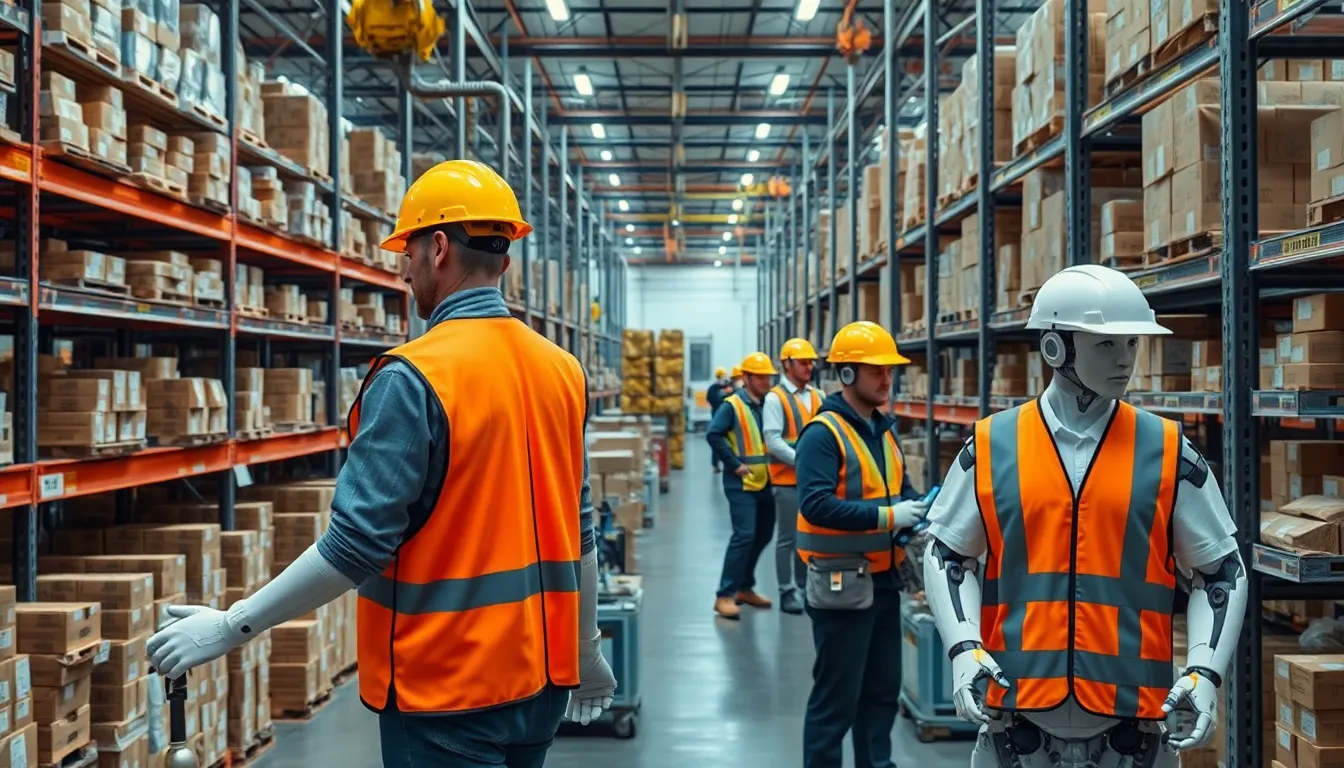In today’s fast-paced global economy, supply chain dynamics play a crucial role in business success. Companies face constant challenges from shifting consumer demands to unexpected disruptions. Staying updated on supply chain news is essential for professionals aiming to navigate these complexities effectively.
From innovations in logistics technology to regulatory changes impacting trade, the landscape of supply chains is ever-evolving. Understanding these developments not only helps businesses adapt but also positions them to seize new opportunities. As industries transform, keeping a finger on the pulse of supply chain news is more important than ever for strategic decision-making.
Table of Contents
ToggleOverview of Supply Chain News
Supply chain news focuses on recent developments impacting logistics and operations across industries. Key topics include advancements in technology, shifts in regulatory frameworks, and changes in consumer behavior. Staying updated on these trends enables businesses to enhance their operational efficiency and responsiveness.
Innovations in Technology
Innovations drive significant changes in supply chain management. Automation tools, such as robotics and artificial intelligence, streamline processes, reducing costs and increasing speed. Companies adopting these technologies often experience improved inventory management and distribution efficiency.
Regulatory Changes
Regulatory changes directly affect supply chain operations. Governments worldwide enact new policies that influence trade agreements, tariffs, and environmental regulations. Companies that closely monitor these changes can mitigate compliance risks and adjust strategies accordingly.
Consumer Behavior Trends
Shifts in consumer behavior play a crucial role in shaping supply chain strategies. Increasing demand for sustainability impacts sourcing decisions, while preferences for faster delivery compel firms to enhance last-mile logistics. Understanding these trends helps organizations align their supply chain practices with customer expectations.
Global Supply Chain Challenges
Global supply chain challenges present ongoing hurdles. Factors like geopolitical tensions, natural disasters, and pandemics disrupt logistics networks, leading to delays and shortages. Companies that proactively assess and adapt to these challenges can maintain continuity and resilience in their operations.
Recent Trends in Supply Chain News

Recent developments in supply chain dynamics reveal significant trends that shape the landscape of logistics and operations. Businesses must be aware of technology advancements and sustainability efforts to navigate these changes effectively.
Impact of Technology Advancements
Technology advancements increasingly influence supply chain efficiency and responsiveness. Innovations such as automation tools, robotics, and artificial intelligence enhance productivity and reduce operational costs. For instance, automated warehouses allow for faster order fulfillment, while AI-driven analytics improve decision-making by predicting demand trends. Businesses that integrate these technologies can optimize inventory management and streamline logistics processes. Furthermore, blockchain technology enhances transparency and traceability in supply chains, enabling better compliance with regulations and improving trust among stakeholders.
Sustainability in Supply Chains
Sustainability in supply chains has emerged as a critical focus for businesses in various sectors. Companies recognize the importance of reducing their carbon footprints and adopting eco-friendly practices. The shift towards sustainable sourcing emphasizes materials that minimize environmental impact and support ethical labor practices. Many organizations are now implementing circular economy principles, which aim to reduce waste through recycling and reuse of materials. In response to consumer preferences for sustainable products, brands that prioritize sustainability not only strengthen their market position but also foster brand loyalty. As regulatory bodies increasingly mandate environmentally friendly practices, businesses must adapt to remain competitive.
Key Challenges Faced in Supply Chain Management
Supply chains encounter various challenges that affect efficiency and effectiveness. Understanding these hurdles enables companies to navigate complexities and implement strategic changes.
Global Disruptions and Responses
Global disruptions, such as geopolitical tensions and natural disasters, create significant obstacles in supply chain management. Events like the COVID-19 pandemic have highlighted vulnerabilities, causing delays and shortages in materials and products. Companies adapt by diversifying sourcing strategies, increasing inventory levels, and investing in risk management practices. Proactive contingency planning becomes essential to mitigate the impact of unforeseen circumstances, ensuring continuity in operations.
Regulatory Changes and Compliance
Regulatory changes affecting trade agreements and environmental compliance significantly influence supply chain strategies. Businesses must stay abreast of evolving regulations, which can vary by region. Non-compliance risks hefty fines and damage to reputation. Implementing robust compliance programs and utilizing technology for tracking and reporting facilitate adherence to regulations. Companies often engage legal expertise to navigate complex regulatory landscapes and secure necessary certifications, ensuring seamless operations across borders.
Innovations Shaping Supply Chain News
Innovations in supply chain management are crucial for enhancing efficiency and meeting changing consumer expectations. Significant technological advancements include automation, artificial intelligence (AI), and blockchain technology.
- Automation Tools
Automation tools streamline operations by minimizing manual processes. These tools enhance accuracy and reduce labor costs, allowing companies to scale operations effectively.
- Artificial Intelligence
AI plays a vital role in predictive analytics and demand forecasting. Companies leverage AI algorithms to analyze data patterns, improving inventory management and reducing waste.
- Blockchain Technology
Blockchain enhances transparency and traceability in supply chains. This technology ensures secure transactions and complies with regulatory requirements, fostering trust among stakeholders.
- Sustainability Initiatives
Sustainability remains a prominent focus. Businesses implement eco-friendly practices and circular economy principles to reduce environmental impact. Adopting sustainable materials and optimizing logistics processes helps companies align with consumer demand for environmentally responsible products.
- Regulatory Adaptation
Regulations affecting trade agreements and environmental compliance necessitate quick adaptability. Companies must ensure that compliance programs integrate the latest legal requirements, utilizing technological solutions for efficient tracking and reporting.
- Consumer Behavior Shifts
Evolving consumer preferences, such as demand for faster delivery and personalized services, drive supply chain adaptations. Businesses respond by optimizing last-mile delivery and incorporating direct-to-consumer models.
Technological innovations and proactive adaptations position companies to navigate disruptions and bolster operational resilience. The integration of these advancements supports a competitive edge in the ever-evolving landscape of supply chain management.
Future Predictions for Supply Chain Developments
Predictions for supply chain developments highlight several key trends likely to shape the landscape in the coming years.
- Increased Automation
Increased automation in supply chain processes will streamline operations. Robotics will manage tasks such as picking and packing, while AI-driven algorithms will optimize routes and inventory management. Businesses adopting these technologies can expect reduced operational costs and enhanced efficiency.
- Enhanced Data Analytics
Enhanced data analytics will improve decision-making capabilities. Leveraging big data will allow companies to forecast demand accurately, optimize logistics, and identify potential disruptions before they occur. Organizations utilizing predictive analytics can respond proactively to changes in consumer behavior.
- Sustainability Initiatives
Sustainability initiatives in supply chains will see greater emphasis. Companies will likely adopt circular economy practices, focusing on recycling and reducing waste throughout the supply chain. Regulatory requirements will drive businesses to implement eco-friendly practices, aligning with growing consumer expectations for sustainability.
- Supply Chain Transparency
Supply chain transparency will become increasingly important. Blockchain technology will play a critical role in ensuring traceability and authenticity. Companies prioritizing transparency will build trust with consumers and stakeholders, enhancing brand reputation.
- Resilience and Risk Management
Resilience and risk management strategies will evolve. Businesses will diversify supplier bases to mitigate risks associated with geopolitical tensions or natural disasters. Proactive contingency planning will strengthen operational continuity and responsiveness to unforeseen events.
- Direct-to-Consumer Models
Direct-to-consumer models will gain traction. E-commerce growth will prompt companies to streamline distribution channels, minimizing intermediaries. Enhanced mobile technologies will facilitate direct interactions with consumers, improving sales channels and customer relations.
- Collaboration and Partnership
Collaboration and partnership among supply chain stakeholders will increase. Companies will foster relationships with suppliers and logistics providers, enhancing communication and flexibility. Collaborative networks can improve overall supply chain performance, enabling quicker responses to market changes.
Understanding these predictions helps businesses prepare for future developments in supply chain management, fostering adaptability and innovation in an ever-evolving environment.
Staying updated on supply chain news is vital for businesses aiming to thrive in a complex environment. As technology continues to evolve and consumer expectations shift, companies must embrace innovation and adapt their strategies accordingly.
By leveraging advancements in automation and AI, organizations can enhance efficiency and reduce costs while meeting the demand for sustainability. Proactive risk management and compliance with regulatory changes are essential for maintaining competitiveness.
Ultimately, a keen awareness of supply chain dynamics equips businesses to navigate challenges and seize opportunities, ensuring they remain resilient and responsive in an ever-changing landscape.



